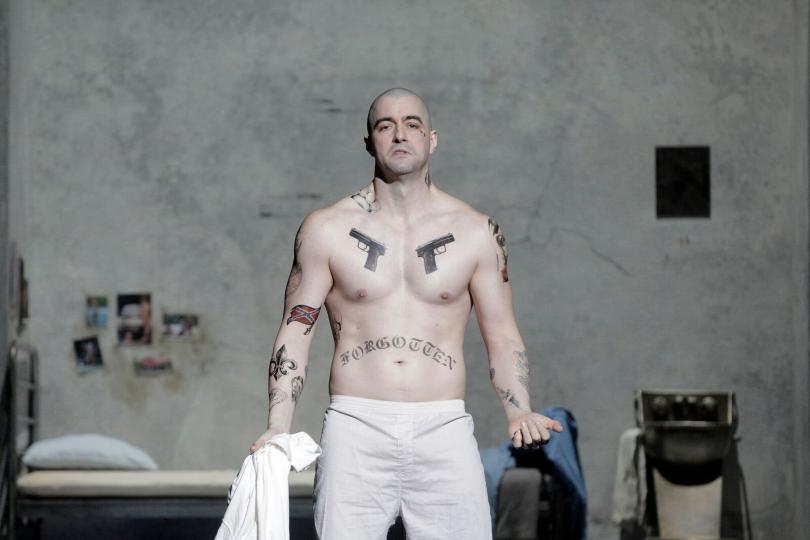The Bar Has Been Raised

For my entire theater-going life I’ve loved stories that are bigger than the everyday. Sci-fi, mythological characters, absurdism. To use the academic term, I love allegory. I’ve always thought an exaggerated form of storytelling was necessary because audiences can’t handle un-diluted stories of a certain magnitude. We know fables about gods and goddesses, we have movies about pirates and starships, musicals about demon barbers and man-eating plants. We don’t write plays depicting the school shooting at Columbine High School or the bombing at the Boston Marathon. I’ve always thought this was because audiences couldn’t handle it. It would be too raw, too real, we would get so overwhelmed that we wouldn’t be able to root for a character or follow a plot. We’d get lost inside our real memories of that day or walk out of the theater to call our children. I’ve always considered some intentional distance to be a necessary component of theater. You must stay one arm’s length away from actual events at all times. On Saturday afternoon I would have told you this was an absolute truth.
Now I no longer believe it.
I walked into the Ordway to watch MN Opera perform some show called Dead Man Walking. I knew it was a relatively new opera based on actual events that were also made into a movie at some point. It was about a prisoner or something. I assumed it would hint at big moral questions and there would be some beautiful singing, and everyone would maintain their proper arm’s lengths. This was not the case. Dead Man Walking is not about gods, goddesses, pirates, or starships. It is about an actual murderer and the actual nun who counseled him in his final days before his lethal injection by the state of Louisiana. The audience is shown the crime, the prison, the unrepentant murderer with swastika tattoos, and the aforementioned brutal conclusion to the story. There is nowhere for the audience to hide. I was in a real room with live actors using their real voices depicting terrible situations of not that long ago. I was not ready to consider my stance on the death penalty, or the question of whether or not the most heinous criminals are worthy of spiritual consideration. But at the same time, I didn’t want the questions to end. I was overwhelmed but the experience was so masterful that I wanted to stay and cherish it. What a rarity that is… to feel immersed in full spiritual turmoil and also completely cared for at the same time. The subject matter was uncomfortable, but I knew I was having my hand held and I knew I would make it to the other side. I have never felt more fully immersed in a theater in my life. But let me back up…
Sister Helen Prejean is a real-life Catholic nun who still lives in New Orleans. She spent a number of years counseling death-row inmates and wrote her experiences into a book I have not read (but I’ve now reserved from the library). The book was turned into a movie (that I have seen) that is beautiful in its own right but isn’t withstanding the test of time very well. It feels very dated and the viewer (me) is left thinking about the fashion choices of the 90s and what Susan Sarandon, Sean Penn, and Jack Black (really?! Jack Black in a serious role?!) have been up to since then. I have tremendous respect that the movie was made in the first place (and its popularity directly gave rise to the opera) but watching the movie is dipping a toe in the water, seeing the opera is getting pushed into the pool.
From the opening note of the overture it’s clear that this is not your grandparents’ opera. Though traditionally outfitted, the orchestra’s beginning sounds like a contemporary movie soundtrack, not to say that it sounds ‘Hollywood’ or cliché but it offers you the feeling of a particular mood in a particular time and place. The music does not project the feeling that a composer is trying to be clever or carve out some niche for themselves.
Accompanying the opening (and then throughout) were remarkable projections. First on a scrim and then on set pieces and actors, they created movement and scenery in a beautiful simple way. For a couple scenes the orchestra was silent while pre-recorded (and pre-composed music by the show’s same composer) was played through a tiny radio on stage. The first of these scenes was so brutal and graphic that I won’t even describe it here. The show’s printed program has a brief content warning (along with one in the lobby that I didn’t see until intermission), but the warning seemed too mild to handle the unspeakably violent acts shown on stage. The printed program recommends the show is not for viewers under the age of 15. Paired with the ‘prisoners’ lewd gestures and clearly articulated profanity I’d even say a 15-year-old would need to be very mature and well-counseled in order to feel ok with this show.
After the overture and non-verbal horrid depiction, the first sung scene introduces our hero, Sister Helen. This character is overtly religious but accessible to everyone with humble statements like “…make me strong, make me wise, make my human. Amen.” This first singing scene felt rough to me (compositionally, not for lack of onstage talent). The previous 5 minutes felt like a movie but now everyone is singing in a way that normal humans (and even movie humans) don’t. This scene has an impossible task to do of getting the entire audience into the world of operatic presentation of the story. It takes this entire scene to acclimatize and get used to this intense subject matter being delivered not with intense camera angles but with big singing in a big room. After about 5 minutes, I was up to speed, at which point the grandiose nature of operatic singing seemed like the only possibility for presenting such heavy subject matter... a scene between a death row inmate (in his cell) and a nun, a scene of the inmate’s mother pleading for parole while the victim’s family sits behind her; these scenes are not possible by conventional means.
The show is also, somehow, not without humor. At the perfect moments, jokes were told, and levity was offered. The script and music of this show are tremendous but would mean nothing without brilliant direction and flawless presentation. I could list the perfect performances by Catherine Martin, Seth Carico, Emily Pulley, Andrew Wilkowske, Karen Slack… but I would end up listing the entire cast because the acting and singing of every person on that stage was perfection. Not once did I hear or see an inconsistency that pulled me from the world. Yes, some characters were especially compelling, but the entire stage was a team effort of a company supporting each other for the sake of the story. Further, every aspect of the show was cohesive in a way that could only come from a focused direction, led by Joel Ivany.
Our hero nun is the protagonist, but we spend a great deal of time with convicted murderer Joseph de Rocher. He is not likable. He has white supremacist tattoos, is vulgar and won’t admit to his crimes. But still, Sister Helen Prejean believes in the worth of his life. She devotes months to his cause, not necessarily to commute his sentence but to offer him her love as a fellow sinner. At this point I’m not sure if I’m offering you a review of the show or of actual events but this all raises serious questions: this man who represents the worst part of humanity, is he worthy of divine love? Of human love? Is he worthy of your time? Is he worth driving 3 hours each way to spiritually counsel? Would that time be better spent with orphans or victim’s families? Sister Helen Prejean is more idealistic than you or I will ever be, which makes her an amazing character. Could I do what she did? Is it worthwhile? Is it foolish? Was he worth it? What the hell am I doing with my cozy little life?
During the second act I completely lost track of myself; what day of the week it was, what I do for a job, that there were other people around me, that I was in a theater and those are actors who are just pretending. The only thing that brought me back was the audible sound of audience members weeping. Openly. And not just one or two, I heard sobbing on all sides. Myself, I’m not a crier. The last time I cried was the day the world lost Pete Seeger, January 27, 2014. In many live theaters I’ve felt inspired, conflicted, agonized, tortured, crushed, or otherwise moved but in all of my 32 years I’ve never once cried in the audience of a show.
Until Saturday night during the second act.
There’s one specific moment that is the most incredible thing I’ve ever seen on a stage. I maintain a personal code not to reveal spoilers in my reviews, so I won’t (but if you want to hear about this scene send me an email and I’ll absolutely tell you).
In the program notes, composer Jake Heggie wrote “The opera did what we had hoped: it moved and surprised people and brought them into a dialogue about something they had perhaps only considered in the abstract.” I thank all that is holy for this. By “this” I mean the far reaches of what art can do. Thank you, Jake Heggie, for the music, thank you Terrence McNally for the words, thank you MN Opera for bringing it to my town. Not only do I consider it to be boldly creative, but I consider it to be a public service. Every person who walks into this show walks out with a deeper appreciation of their life OR a renewed sense of empathy OR just a wakeup call to not be afraid of profound experiences. So, thank you in advance to all the theater companies who lean into heavy pieces like this one. In our era of weekly school shootings and possibly impending nuclear war you’re offering your audience an opportunity to learn how to wrangle heavy emotions, in a group, without feeling isolated. You’re teaching us to communicate.
There are only a few performances left. Yes, tickets are still available but you need to act quickly. Which leaves me with the knowledge that you, dear reader, probably won’t get to see this production. I wish you could. Or at least I wish you could watch a video recording of it…but then again that would defy the experience itself. The only way to have no arm’s length between your soul and this work is to see it live. So, if you’re not able to get to the Ordway, at least know this: Audiences are capable of more than anyone thought. You don’t have to shy away from any story if it’s balanced with optimism and presented with perfection. Audiences can handle it. You can handle it. There is no limit. Now go, do the wild thing you think the world isn’t ready for.




